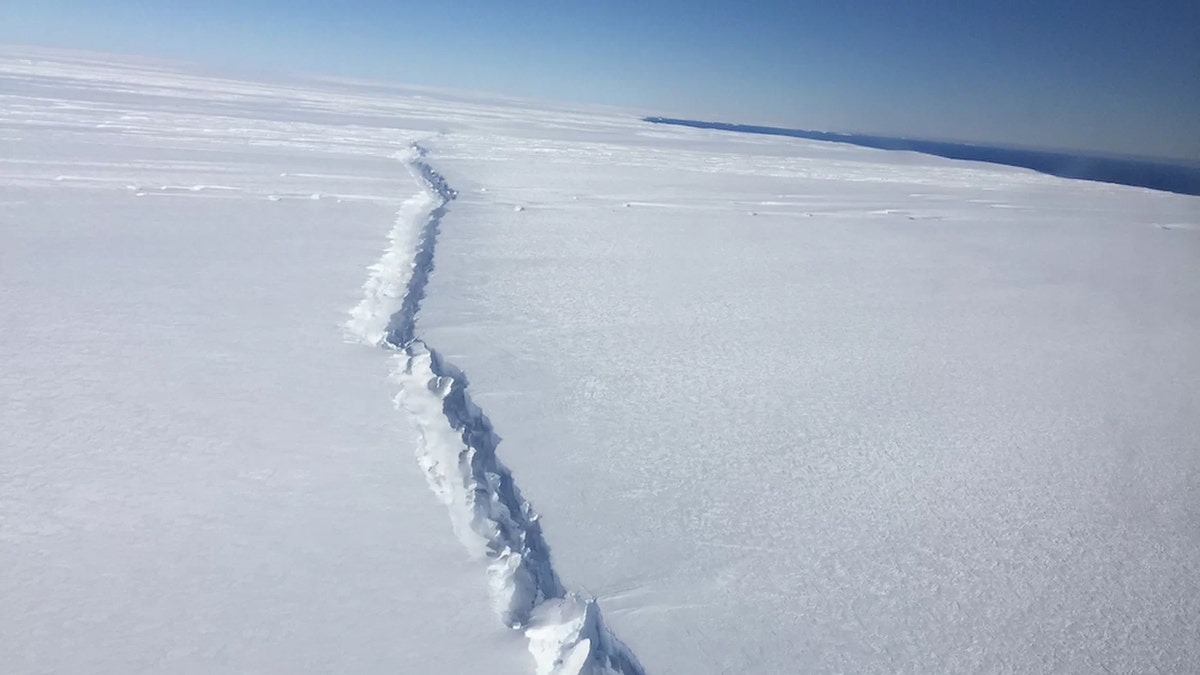
The A-68 iceberg separated from the Larsen C ice shelf in July 2017. Credit: Nathan Kurtz/NASA
An alarming new study shows that ice in Antarctica is melting more than six times faster than it did in the 1980s, including areas that were thought to be relatively stable and resistant to change.
The study, published in the Proceedings of the National Academy of Sciences, shows that Antarctic ice melting between 1979 to 2017 raised global sea levels more than 1.4 centimeters and the ice loss is accelerating dramatically — a key indicator of human-caused climate change.
Scientists used aerial photographs, satellite measurements and computer models in 176 individual basins to make the determination.
"The mass loss is dominated by enhanced glacier flow in areas closest to warm, salty, subsurface circumpolar deep water, including East Antarctica, which has been a major contributor over the entire period," a statement in the study said. "The same sectors are likely to dominate sea-level rise from Antarctica in decades to come as enhanced polar westerlies push more circumpolar deep water toward the glaciers."
ANCIENT ANTARCTIC ICE SHEET COLLAPSE COULD CAUSE A GLOBAL FLOOD
Since 2009, Antarctica has lost almost 278 billion tons (252 billion metric tons) of ice per year, according to the new study. In the 1980s, it was losing 44 billion tons (40 billion metric tons) a year.
"During the entire period, the mass loss concentrated in areas closest to warm, salty, subsurface, circumpolar deep water (CDW), that is, consistent with enhanced polar westerlies pushing CDW toward Antarctica to melt its floating ice shelves, destabilize the glaciers, and raise sea level," the study's abstract reads.
Eric Rignot, the lead author on the study, said the loss of ice in East Antarctica, an area that had been relatively stable, is exceptionally troubling. East Antarctica is losing 56 billion tons of ice a year, the study found. By contrast, last year's study found little or no loss in East Antarctica and had actually found gains, leading to the concern.
The melting in the area "increases the risk of multiple meters (more than 10 feet) sea level rise over the next century or so," Rignot said. The melting seen in West Antarctica and the Antarctica Peninsula account for about four-fifths of the ice loss.
A number of studies have shown that global sea levels have risen approximately 8 inches over the past century, with sea-level rises getting higher in some parts of the globe. Coastal areas, such as Florida, Bangladesh and cities like London and Shanghai are at risk.
THESE WATER MOLECULES HAVE BEEN SITTING UNTOUCHED IN THE DEEP PACIFIC FOR 700 YEARS
In 2017, a study suggested that New York City could be in danger of getting hit with storms that occurred once every 500 years, every five years.
If global sea levels were to rise by 1.8 meters (nearly 6 feet) by 2100, that would be a "worst-case scenario" forecast by some scientists and could destroy the aforementioned coastal cities, along with many others across the planet.
In December, a study presented by geologists suggested that if the West Antarctic ice sheet (WAIS) melted, it could cause a massive global flood.
"Ice-sheet models link Pine Island glacier absence to full WAIS collapse into ice caps on mountains," the study's abstract read. "Our record thus provides the first direct indication of a much smaller LIG WAIS, providing paleo-context for the susceptibility of the WAIS to collapse."
“As the Antarctic ice sheet continues to melt away, we expect multi-meter sea level rise from Antarctica in the coming centuries,” Rignot wrote in a statement accompanying his study and obtained by Reuters.
Another recent study also shed light on the startling rise in sea-levels and the effects climate change is having on the planet. The study said the amount of energy that has been put into the Earth's oceans over the past 150 years is the equivalent of an atomic bomb explosion every second for 150 years.
In September, NASA unveiled its new $1 billion satellite, ICESat-2, to give humanity a stronger, data-backed vision of exactly how fast Earth’s ice is melting.
According to the government space agency, melting ice in Greenland and Antarctica has increased the global sea level more than a millimeter per year, which is a third of the overall increase.
CLICK HERE TO GET THE FOX NEWS APP
The Associated Press contributed to this article.
Follow Chris Ciaccia on Twitter @Chris_Ciaccia
